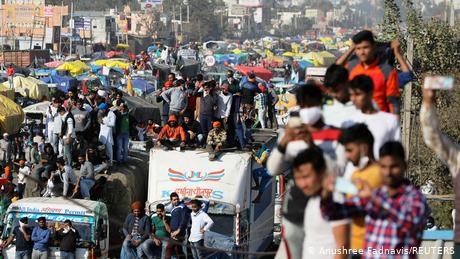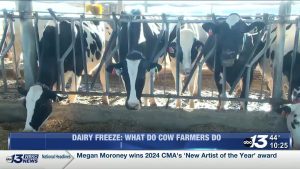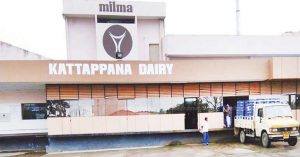Agriculture Minister Narendra Tomar said that talks will take place on December 3.
“Talks were held earlier to remove some misconceptions among farmers, but remained inconclusive. We are ready to open those talks again,” he told reporters on Saturday.
There was no immediate response from the farmers’ representatives. The protesters said they would not return to their homes until their demands were met.
The government’s talks offer came after a day of protests and clashes between the farmers and police outside the capital New Delhi.
Despite the government’s decision to allow protesters to enter the city on Saturday, thousands of farmers continued with their agitation, blocking at least three highways into Delhi, according to local media.
Contradictory claims
In September, India’s parliament passed three controversial agriculture bills, sparking farmers’ protests across the country.
The three bills — the Farmers Produce Trade and Commerce (Promotion and Facilitation) Bill 2020, the Farmers (Empowerment and Protection) Agreement on Price Assurance and Farm Service Bill 2020, and the Essential Commodities (Amendment) Bill 2020 — became laws after they were signed by President Ram Nath Kovind.
Read more: Indian milk farmers say they miss out on record dairy industry profits
The government says the new laws will liberalize farm trade, give freedom to farmers to sell their produce outside regulated markets and enter into contracts with buyers at a pre-agreed price.
The ruling Bharatiya Janata Party (BJP) insists that the laws will fetch better prices and free farmers from traditional middlemen who dominate the trade. The government hopes that its new policy will double farmers’ income by 2022.
Farmers’ associations say the legislation does not guarantee acquisition of farm produce at the minimum support price (MSP), thus leaving them at the mercy of corporations that are now expected to enter the country’s troubled farming sector.
Read more: Why Indian farmers are angry over agricultural reforms
“We are fighting for our rights. We won’t rest until we reach the capital and force the government to abolish these black laws,” said Majhinder Singh Dhaliwal, a farmer leader.
Opposition parties and some allies of Prime Minister Narendra Modi have called the laws anti-farmer and pro-corporation.
Farmers’ misery
Indian farmers have held huge rallies across the country in the past few years to protest against the government’s “neglect” of the agriculture sector amid increasing privatization.
Once accounting for a third of India’s gross domestic product (GDP), the farming sector now produces only 15% of the country’s $2.9 trillion (€2.4 trillion) economy.
More than half of India’s farmers are reportedly in debt, with 20,638 committing suicide in 2018 and 2019, according to India’s National Crime Records Bureau.

















